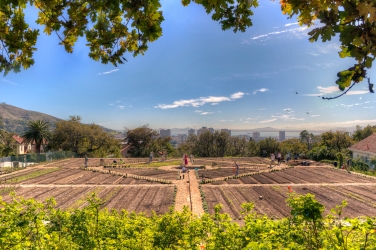Oranjezicht City Farm (OZCF) is a neighbourhood non-profit project celebrating local food and community.
Formerly a bowling green constructed in the 1950s and unused for decades, the site comprises part of the original farm, ‘Oranje Zigt’, established in 1709. OZCF seeks to re-connect the Oranjezicht neighbourhood and the rest of Cape Town to this neglected piece of heritage through design, education and vegetable gardening and to use it as a catalyst to build social cohesion, develop skills, educate residents and their children about food and environmental issues, and champion unused or under-utilised public green spaces in the city.
“Charity begins at home – but should not end there.”
A common question we get is why we are not doing this project in a more needy community. The answer is that there are a number of urban agriculture and community garden projects in neighbourhoods across Cape Town, including Abalimi Bezekhaya with more than 3000 women farmers in poor households across the City. OZCF represents an opportunity for residents of our more affluent neighbourhood to find ways to connect with the other projects, to build bridges to their communities, and to support them through partnerships.
In addition, social change needs to begin in one’s own community, and to go to others and tell them what to do and how without walking the talk oneself is far less effective (or morally defensible) an approach than showing commitment where one lives first.
Beyond gardening
A garden not only preserves open space and offers a respite from the quick tempo of urban life, but also holds the potential to reach past the vegetable plots and flower borders to the larger community. It can be a gathering place to bring people together, strengthening relationships. Ultimately, the garden is a catalyst for change, improving the quality of life and even reducing crime.
Knowledge sharing
Urban farming is just beginning to gain traction in South Africa and OZCF is in the vanguard of small-scale community-based farms. There are hundreds of unused and under-utilised public green spaces that have the potential to serve our communities as places that beautify, educate, feed and strengthen residents. Having navigated the complex and daunting bureaucratic, legal, horticultural, financial and other practical obstacles to get OZCF started on public land with volunteer labour, we can provide mentoring, administrative support, education and additional resources to help catalyse, inspire and strengthen other groups keen to do something similar.
Finally, to believe that we and our children cannot benefit in profound ways from understanding where and how food is produced, where and how our waste is handled and the kinds of effects our lifestyles are having on the environment is short-sighted. As among the more privileged Capetonians, we are particularly obligated to understand these issues and to mitigate our own negative impacts on resource use and the environment. OZCF is an important way that we can come to understand and deal with these issues in a manner that is constructive, collaborative and sustainable.
The Farm is a community-based non-profit, but it will be working hard to earn money to support itself by growing and selling vegetables, operating a tea room, selling compost, seedlings, t-shirts and other gardening-related items, and more. Once these income-generating activities are fully up and running in the months and years to come, they will be enough to cover the core running costs of farming, but it will not be enough to pay for the full range of educational and outreach programmes that will make the Farm such an important community asset.
Long-Term Vision:
Our Mission: The Oranjezicht City Farm is a community of adults and younger folk working together to engage in small-scale food production in the City Bowl of Cape Town.
Our Vision: To improve under-utilised public green spaces and build social cohesion by creating demonstration gardens for hands-on community-wide food gardening education, thereby increasing community resiliency and health.
World Design Capital for 2014
Cape Town is the designated World Design Capital for 2014 and we have worked with a board member of that initiative and others to link with City 2.0 visions for Cape Town. This also includes the Cape Town Partnership, the City of Cape Town’s Environmental Resource Management Department, The Centre for African Cities at the University of Cape Town, and others. We’re a small part of the picture, but as a practical, community-driven project we’re actually making it happen where we happen to live, aligned with the broader vision for Cape Town.
Full story see Cape Town Green Map






